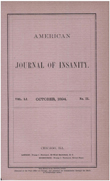Serotonergic and noradrenergic dysregulation in alcoholism: m- chlorophenylpiperazine and yohimbine effects in recently detoxified alcoholics and healthy comparison subjects
Abstract
OBJECTIVE: This study compared serotonergic (5-HT) and noradrenergic reactivity in recently detoxified alcoholic patients and healthy comparison subjects. METHOD: Participants were 22 male inpatients who met DSM-III-R criteria for alcohol dependence and who were abstinent for 12-26 days and 13 male healthy comparison subjects. Subjects completed 3 days of testing over 2 weeks under double-blind conditions that involved the intravenous infusions of m-chlorophenylpiperazine (mCPP), yohimbine, or a saline placebo. Drug effects on mood, physiologic responses, and plasma levels of cortisol, prolactin, and 3- methoxy-4-hydroxyphenylglycol (MHPG) were measured. RESULTS: Both mCPP and yohimbine infusion increased nervousness, vital signs, and plasma cortisol, prolactin, and MHPG levels relative to placebo Cortisol responses to mCPP were blunted in the alcoholic patients relative to the comparison subjects. Cortisol and prolactin responses to yohimbine were greater in the alcoholic patients, whereas their pulse increases after yohimbine infusion were blunted. No group differences emerged in MHPG, nervousness, or blood pressure responses to either drug. CONCLUSIONS: This study documents persistent alterations in neuroendocrine responsivity of both 5-HT and noradrenergic systems in alcoholic patients after detoxification. Blunted cortisol responses to mCPP in these recently detoxified patients may reflect reductions in 5- HT2 receptor function. The absence of altered MHPG responses to yohimbine in the alcoholic patients suggests that presynaptic noradrenergic responsivity is not persistently altered in these patients. In contrast, the enhanced cortisol responses and reduced pulse responses to yohimbine in alcoholic patients may reflect down- regulation of postsynaptic noradrenergic receptors.
Access content
To read the fulltext, please use one of the options below to sign in or purchase access.- Personal login
- Institutional Login
- Sign in via OpenAthens
- Register for access
-
Please login/register if you wish to pair your device and check access availability.
Not a subscriber?
PsychiatryOnline subscription options offer access to the DSM-5 library, books, journals, CME, and patient resources. This all-in-one virtual library provides psychiatrists and mental health professionals with key resources for diagnosis, treatment, research, and professional development.
Need more help? PsychiatryOnline Customer Service may be reached by emailing [email protected] or by calling 800-368-5777 (in the U.S.) or 703-907-7322 (outside the U.S.).



